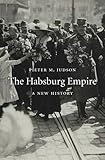The Habsburg empire : a new history / Pieter M. Judson.
Material type: TextPublisher: Cambridge, Massachusetts ; London, England : The Belknap Press of Harvard University Press, 2016Description: xiii, 567 pages : illustrations, maps ; 25 cmContent type: text Media type: unmediated Carrier type: volumeISBN: 9780674047761; 0674047761Subject(s): Habsburg, House of -- History | Habsburg, House of | Habsbourg dynastie | Habsburger Familie | Arbeitsgemeinschaft Rüstungsautonomie und Äussere Sicherheit | Nationalism -- Europe, Central -- History | Imperialism -- Social aspects -- Europe, Central -- History | Imperialism -- Social aspects | Nationalism | Europe, Central | Herrschaft | Imperialismus | Nationalismus | Soziale Situation | Österreich-Ungarn | Autriche | MitteleuropaGenre/Form: History.DDC classification: 943.6/04 LOC classification: DB36.3.H3 | .J83 2016Other classification: 943.604
TextPublisher: Cambridge, Massachusetts ; London, England : The Belknap Press of Harvard University Press, 2016Description: xiii, 567 pages : illustrations, maps ; 25 cmContent type: text Media type: unmediated Carrier type: volumeISBN: 9780674047761; 0674047761Subject(s): Habsburg, House of -- History | Habsburg, House of | Habsbourg dynastie | Habsburger Familie | Arbeitsgemeinschaft Rüstungsautonomie und Äussere Sicherheit | Nationalism -- Europe, Central -- History | Imperialism -- Social aspects -- Europe, Central -- History | Imperialism -- Social aspects | Nationalism | Europe, Central | Herrschaft | Imperialismus | Nationalismus | Soziale Situation | Österreich-Ungarn | Autriche | MitteleuropaGenre/Form: History.DDC classification: 943.6/04 LOC classification: DB36.3.H3 | .J83 2016Other classification: 943.604 | Item type | Current library | Call number | Copy number | Status | Notes | Date due | Barcode |
|---|---|---|---|---|---|---|---|
 Books
Books
|
Main Library | DB36.3.H3 .J83 2016 (Browse shelf (Opens below)) | 1 | In transit from Main Library to Female Library since 01/27/2022 | STACKS | 51952000227069 | |
 Books
Books
|
Main Library | DB36.3.H3 .J83 2016 (Browse shelf (Opens below)) | 1 | Available | STACKS | 51952000227076 |
Browsing Main Library shelves Close shelf browser

|

|

|

|
No cover image available |

|

|
||
| DA960 .L87 2015 Revolutionary Ireland, 1912-25 / | DA962 .W323 2011 The news from Ireland : foreign correspondents and the Irish revolution / | DAW1046 .M44 2016 Medieval East Central Europe in a comparative perspective : from frontier zones to lands in focus / | DB36.3.H3 .J83 2016 The Habsburg empire : a new history / | DC148 .D69 2002 The Oxford history of the French Revolution / | DC203 .R678 2014 Napoleon : a life / | DC73 .F7513 2016 Charlemagne / |
Includes bibliographical references (pages 455-543) and index.
The accidental empire -- Servants and citizens, empire and fatherland, 1780-1815 -- An empire of contradictions, 1815-1848 -- Whose empire? the revolutions of 1848-1849 -- Mid-century modern: the emergence of a liberal empire -- Culture wars and wars for culture -- Everyday empire, our empire, 1880-1914 -- War and radical state-building, 1914-1925 -- Epilogue: The new empires.
"Moving beyond older approaches to the history of the Habsburgs in Central Europe in which nations are the main actors and nationalist conflict the inevitable moving force in the monarchy's trajectory, Pieter Judson offers an alternate narrative framework for the history of Habsburg Central Europe from the eighteenth century to the demise of the empire in World War I. He investigates how shared imperial institutions, administrative practices, and cultural programs helped to shape local society in every region of the empire. He shows how all of these elements gave imperial citizens fundamentally common experiences that crossed linguistic, confessional, and regional divides--experiences that even shaped nationalists' understandings of nationhood. And he traces what happened to the common or shared elements of imperial practice when the Habsburg monarchy formally ceased to exist in 1918."--Provided by publisher.
"In a panoramic and pioneering reappraisal, Pieter Judson shows why the Habsburg Empire mattered so much, for so long, to millions of Central Europeans. Across divides of language, religion, region, and history, ordinary women and men felt a common attachment to "their empire," while bureaucrats, soldiers, politicians, and academics devised inventive solutions to the challenges of governing Europe's second largest state. In the decades before and after its dissolution, some observers belittled the Habsburg Empire as a dysfunctional patchwork of hostile ethnic groups and an anachronistic imperial relic. Judson examines their motives and explains just how wrong these rearguard critics were. Rejecting fragmented histories of nations in the making, this bold revision surveys the shared institutions that bridged difference and distance to bring stability and meaning to the far-flung empire. By supporting new schools, law courts, and railroads, along with scientific and artistic advances, the Habsburg monarchs sought to anchor their authority in the cultures and economies of Central Europe. A rising standard of living throughout the empire deepened the legitimacy of Habsburg rule, as citizens learned to use the empire's administrative machinery to their local advantage. Nationalists developed distinctive ideas about cultural difference in the context of imperial institutions, yet all of them claimed the Habsburg state as their empire. The empire's creative solutions to governing its many lands and peoples--as well as the intractable problems it could not solve--left an enduring imprint on its successor states in Central Europe. Its lessons remain no less important today." -- Publisher's description
1 2

There are no comments on this title.